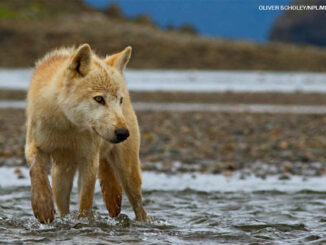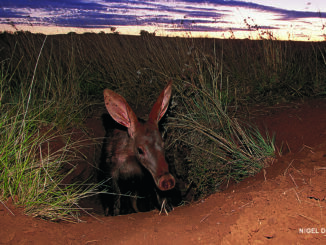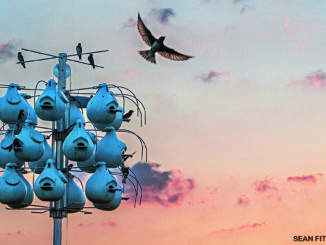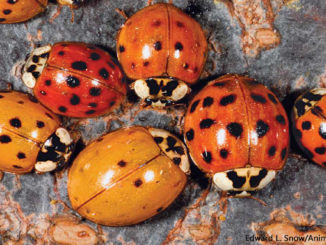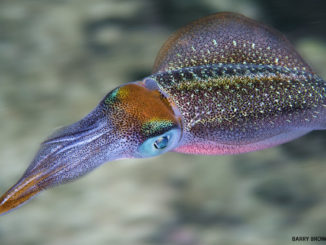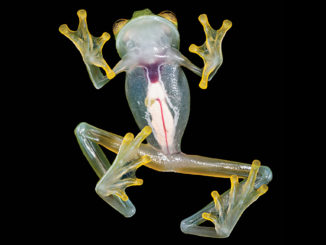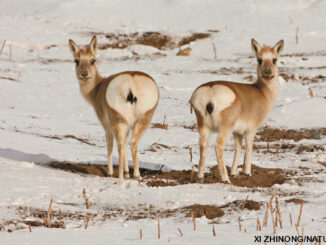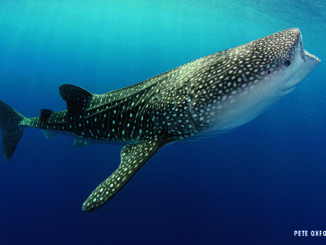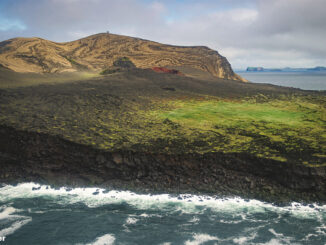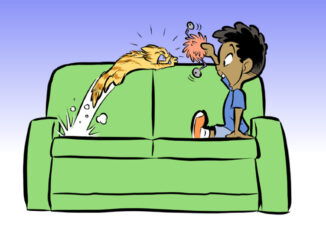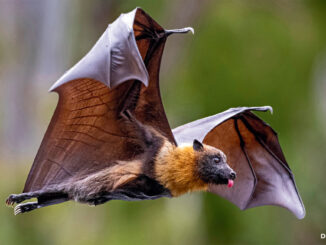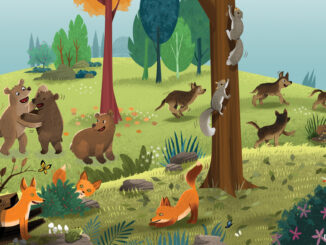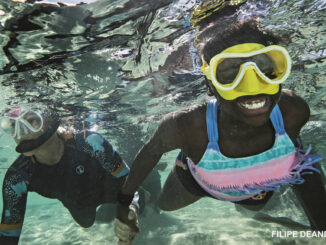
What Would YOU Do?
By Gerry Bishop; Art by Debbie PalenSpring is here, and all kinds of things are going on outside. You don’t want to miss the action, but are you sure you’re ready for any “wild” surprises? Take this quiz to find out!
 1. You see a baby bird hopping along the ground. When it tries to fly, it can only flutter. You should. . .
1. You see a baby bird hopping along the ground. When it tries to fly, it can only flutter. You should. . .
A. leave the bird alone.
B. put it in a box and feed it worms.
C. take it to an animal shelter or wildlife rehabilitator.
2. You discover a nest of baby rabbits in your backyard, and you can’t see the mother anywhere. You should. . .
A. take the babies into the house and feed them milk from an eye-dropper.
B. take them to a wildlife rehabilitator or an animal shelter.
C. leave the rabbits alone.
3. While riding in a car, you see a turtle crawling across the road. You should. . .
A. warn your driver so he or she can avoid hitting it.
B. ask your driver to stop so you can take it home and keep it safe in your backyard.
 C. ask your driver to stop so you can carry the turtle to safety.
C. ask your driver to stop so you can carry the turtle to safety.
4. You see a raccoon climbing into your trash can one night. You should. . .
A. yell at it to scare it away.
B. put pet food or leftovers outside so it doesn’t have to eat trash.
C. make your trash can “raccoon proof.”
5. You and your family are camping when you hear something outside your tent at night. You should. . .
A. start screaming as loudly as you can.
B. poke your head outside and try to see what it is.
C. forget about it and go back to sleep.
 6. You’re hiking with your friends, and you see a snake on the trail in front of you. You should. . .
6. You’re hiking with your friends, and you see a snake on the trail in front of you. You should. . .
A. turn around and run the other way.
B. stop to admire it.
C. throw a rock or stick at it to get it to move.
7. You lift up a rock along a stream and find a salamander under it. You should. . .
A. grab the salamander quickly before it can get away.
B. slam the rock down before the salamander can bite.
C. look at the salamander and then lower the rock carefully.
8. You find some bats hanging in your attic. You should. . .
A. put on gloves, gently catch the bats, and release them outside.
B. scare them off with a loud noise.
C. block their entryway after they leave at night to hunt for food.
9. You’re having a picnic next to a pond. Some ducks come up to you, begging for a handout. You should. . .
A. ignore them until they go away.
B. catch them and turn them over to the police.
 C. go ahead and give them a little snack.
C. go ahead and give them a little snack.
10. You’re riding in a car in a national park and see a mother bear and her two little cubs. You should. . .
A. get out of the car and get a good picture.
B. roll down a window and take a picture while still inside the car.
C. keep the windows up and leave as quickly as you can.
ANSWERS
1-A Some baby birds leave the nest before they can fly well. One or both of its parents are nearby, keeping an eye on it and bringing it food. Sometimes a very young and helpless bird falls out of its nest. If you see and can easily reach the nest, you can put the baby back into it. (It’s not true that parent birds will reject a baby that has been touched by people.)
2-C A mother rabbit feeds her babies for only a few minutes each day. For the rest of the time, she may be nowhere in sight. But don’t worry about the babies—they’ll be just fine. Stay away and let the mother return to them.
3-A and C Turtles often have to cross roads to get where they can find food, mates, or places to lay eggs. If you see a turtle on the road, it’s OK to stop and try to help it across—as long as it’s safe for you to do so! Only when you are completely sure nothing is coming either way, quickly pick up the turtle and carry it to the side it was heading toward.
4-C Trash cans are tempting for raccoons and many other animals. If your can has a secure lid, you can help keep these creatures out of trouble. And by the way, you should never feed any kind of wildlife, other than songbirds and squirrels.
 5 If you’re curious, B is the right choice. If not, then C is the way to go. Trying to scare away a wild animal is usually unnecessary and can be dangerous. Most animals come into a campground looking for food, so be sure to keep all food in a safe place—and never, ever, inside your tent!
5 If you’re curious, B is the right choice. If not, then C is the way to go. Trying to scare away a wild animal is usually unnecessary and can be dangerous. Most animals come into a campground looking for food, so be sure to keep all food in a safe place—and never, ever, inside your tent!
6-B All snakes are harmless from a distance. And only a few are dangerous if you get too close. If you see a snake, it’s OK to slowly and quietly move closer to get a better look—up to about eight feet away. At that distance, try to see what kind it is. If you’re sure it’s not venomous, you can move even closer. If you aren’t sure, enjoy watching it from where you are.
7-C The world beneath a rock or log can be an amazing place. But when you lift a rock or roll over a log, remember this: You’re now a guest in someone’s home. Enjoy what you see there, but don’t try to pick up anything. (Many of the animals there are delicate.) Then gently—VERY gently—put the rock or log back exactly where you found it.
8-C Bats make helpful neighbors because they eat pesky bugs. But sometimes they find a way into people’s attics, which they use for shelter during the day. To make sure your attic is bat-free, you can block their entryway after they fly out in the evening. It’s important to know when (definitely not during “baby season”) and how to do this, so hire a bat-control expert for the task.
9-A Ducks and other animals can become beggars when people feed them. That’s not good for people, and it surely isn’t good for the animals. (Feeding them can make them sick, or it can cause other problems.)
10-C The animals in a park may seem tame, but they are wild and can be dangerous—especially a mother bear with her cubs. Get out of your car only when a park ranger is there to tell you it’s OK. Always obey the rules of the park and never get too close to bears.


